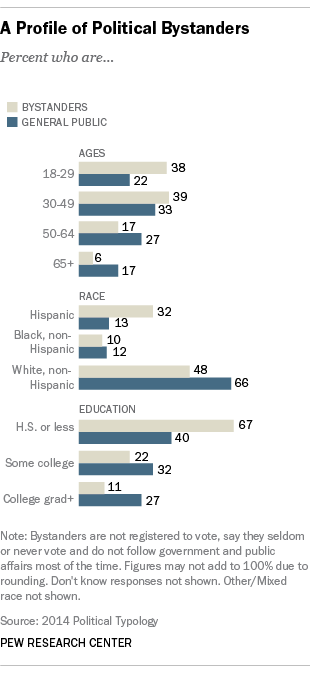 As Republicans and Democrats gear up for midterm elections this November, there’s one group of Americans that is paying very little, if any, attention to the whole ordeal.
As Republicans and Democrats gear up for midterm elections this November, there’s one group of Americans that is paying very little, if any, attention to the whole ordeal.
Overall, 10% of Americans are what we call Bystanders, or the politically disengaged, according to Pew Research Center’s Political Typology report. None of this cohort say they’re registered to vote, and none say they follow government and public affairs most of the time (this compares with 48% of Americans overall). Virtually all of this group (96%) say they’ve never contributed money to a candidate running for public office.
In our typology, we categorized Americans into eight groups–among them, Solid Liberals and Steadfast Conservatives–using 23 questions about a wide range of political values. Most of the analysis is focused on seven main groups in the political typology that are defined by these political values. But the Bystanders, defined by their lack of political engagement, give a glimpse of the views of those on the political sidelines. (Note: For that reason, it is not possible in our online quiz to be categorized as a Bystander.)
Steadfast Conservatives: Generally critical of government, especially social safety net programs, but also critical of big business and immigrants. Most are very socially conservative.
Business Conservatives: Overall, critical of government regulation and social-welfare spending, but not of big business. For the most part, moderate to liberal on social issues, with positive views toward immigrants.
Young Outsiders: Tend to be distrustful of government programs and fiscally conservative, but very liberal on social issues and not very religious.
Hard-Pressed Skeptics: Generally distrustful of government, except for social safety net spending. On average, low-income, anti-immigrant compared with other groups.
Next Generation Left: Generally positive feelings about government, but less so for social programs. Tend to be business-oriented and individualistic.
Faith and Family Left: By and large, highly religious, socially conservative, but strongly support social safety net and government action more broadly.
Solid Liberals: Overall, highly supportive of social programs, immigrants and government generally; very skeptical of business and markets. Consistently liberal on social issues, from homosexuality to environmental protection.
Bystanders: On the sidelines of the political process. Not registered to vote, and pay very little attention to politics.
While Bystanders view the Democratic Party more favorably than the GOP, they have a mix of liberal and conservative attitudes. They are sympathetic to the plight of the poor, but as many say that government aid to the poor does more harm than good as vice versa. They express fairly liberal views on homosexuality and same-sex marriage, but 54% say abortion should be illegal in all or most cases.
Bystanders are young (38% are under 30), and nearly a third (32%) are Hispanic. A third of Bystanders are foreign born, a higher share than any of the other typology groups, including 29% total who are not citizens.
Asked about their interest in a number of topics, 73% of Bystanders say they have no interest in government and politics, and two-thirds (66%) say they are not interested in business and finance. So what topics do interest them? Health, science and celebrities: 64% of Bystanders are interested in celebrities and entertainment (vs. 46% of the public). And, in a sign of their youth, they are drawn to video games: 35% call themselves a “video or computer gamer” (vs. 21% of the public).
In our survey, Bystanders were often more likely than other political cohorts to answer “don’t know,” to say they’ve “never heard of” the topic in question or to refuse to answer questions altogether.
What’s your political typology? Take our quiz to find out.


